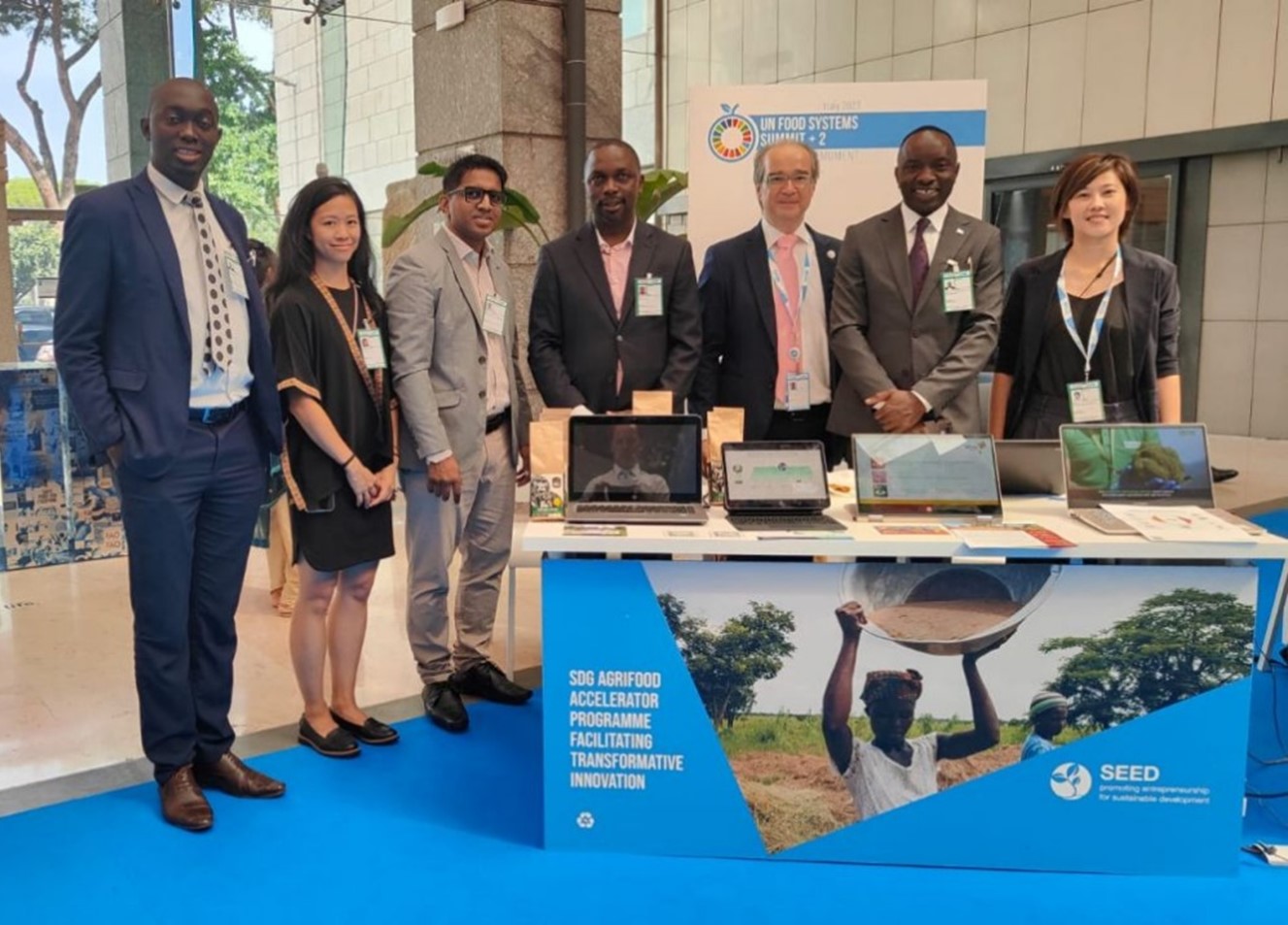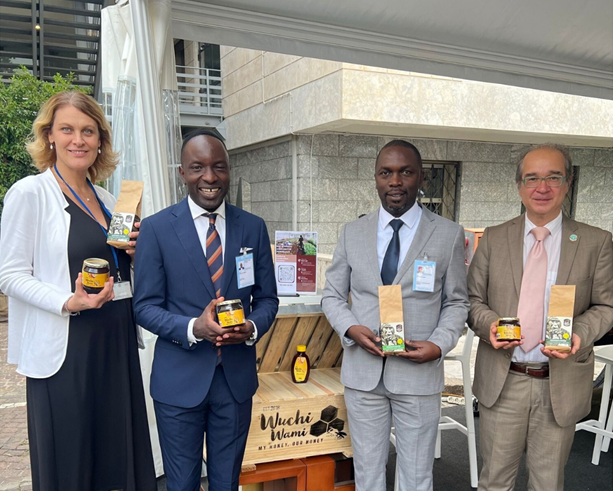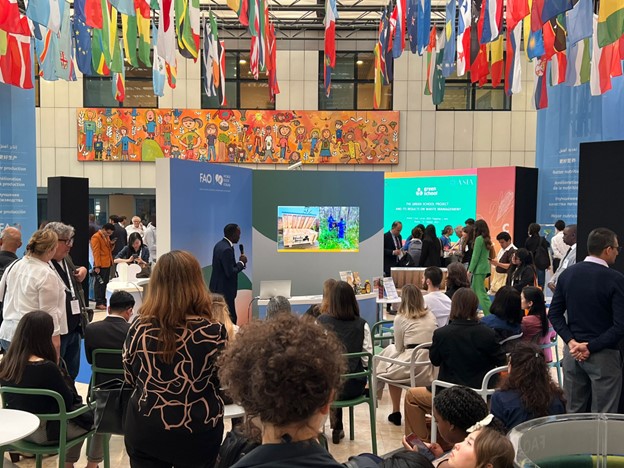SDG Agrifood Accelerator Programme - Innovators Spotlight Agrifood SMEs' Role in Food Systems Transformation at the UNFSS+2 and 2023 World Food Forum

UNFSS+2 Side Event on agrifood transformation for the SDGs: Innovations and SMEs as the game changers, which took place on 26 July 2023.
©FAO
Innovators from the FAO SDG Agrifood Accelerator Programme have been shining a spotlight on their pioneering enterprises at numerous high-level events over the last number of months, including at the UN Food Systems Summit +2 Stocktaking Moment (UNFSS+2) and the 2023 World Food Forum, highlighting the vital role SMEs play in catalyzing effective food system transformation while simultaneously accelerating SDG implementation at local levels.
The SDG Agrifood Accelerator Programme is an initiative by FAO, developed in collaboration with and technically supported by SEED. The Programme supports select small and medium sized enterprises from 8 developing countries, who are pioneering solutions to transform agrifood systems through enhancing environmental protections and improving the lives of marginalized members of their communities. It provides the involved agrifood innovators with tailored coaching and a toolkit of resources to help scale-up their business and accelerate action towards the SDGs.
UN Food Systems Summit +2 Stocktaking Moment
The UNFSS+2, which took place on the 24-26 July at FAO Headquarters in Rome, was a major milestone in global discussions on progress towards sustainable food systems for the achievement of the SDGs. Six of the eleven enterprises participating in the first cohort of the programme attended, including Gorilla Conservation Coffee (Uganda), ListenField (Thailand), Wuchi Wami (Zambia), Farmers Fresh Zone (India), Mooto Cashew (Zambia) and AfriLeap (South Africa). Alongside representatives from SEED, who provided insights into the practical approach and tools employed in the SDG Agrifood Accelerator Programme, these innovators showcased their individual products and enterprises, in the UNFSS+2 exhibition hall and engaged with attending policymakers, investors, fellow entrepreneurs, and activists.

Left to Right: Mwala Mooto, Mooto Cashew (Zambia), Sonya Ong, SEED, Pradeep P S, Farmers Fresh Zone (India) Edward Sekandi, Gorilla Conservation Coffee (Uganda), Stefanos Fotiou FAO Director of the Office of SDGs, Harry Malichi, Wuchi Wami (Zambia) Rassarin Chinnachodteeranun, ListenField (Thailand) at the UNFSS+2 exhibition booth presenting the FAO SDG Agrifood Accelerator Programme.
©SEED
Additionally, a dedicated side event was organized and moderated by SEED, focusing on ‘’Agrifood transformation for the SDGs: Innovations and SMEs as the gamechangers’’. Through this event, SEED and the participating entrepreneurs made a compelling case for recognizing SMEs as key partners in shaping the future of food systems and achieving the SDGs, drawing attention to the fact that, despite their significant contributions, SMEs are often overlooked in high-level discussions and policy-making.
Representatives from Governments of Flanders and the Netherlands joined the diverse panel of speakers to underscore the importance of involving the private sector in sustainability discussions. Both speakers stressed the commitment of the states to supporting SMEs in developing countries to enable them to become agents of change. Reflecting on local examples, Anne Laure Léger, General Representative for the Government of Flanders to FAO, WFP and the Italian Republic, cited the success of Flanders Food, in working toward improving the agri-food ecosystem through investment in agrifood research and innovation in Belgium. Ralf Van De Beek from the Ministry of Agriculture, Nature, and Food Quality in the Netherlands, shed light on the Dutch Diamond approach, which fosters collaboration between government, businesses, civil society, and financial institutions to drive transformation.
Reflecting on the perspective and approach from the UN System, Hajnalka Petrics, Programme Officer at FAO’s Office of SDGs pointed to the deep local roots of SMEs, which make them rely on and motived to find innovative solutions to local challenges. FAO aims to address the financial and capacity development supports needed by SMEs through collaborations like the SDG agrifood Accelerator Programme. Salman Hussain, acting Head of the Ecosystem Services Economics Unit at UNEP discussed the need to shift incentives and regulatory frameworks in businesses to promote sustainability. This is reflected in UNEP's approach to convince both the public sector and agrifood businesses to assess their impact and dependency on natural capital and recognize that protecting natural capital is in their best interest.
The event further highlighted the necessity of enabling and catalyzing innovations to address global food system challenges. Representatives from ListenField in Thailand, Wuchi Wami in Zambia, and Farmers Fresh Zone showcased their innovative approaches:
ListenField, represented by its CEO and co-founder, Rassarin Chinnachodteeranun, is developing decision-assisting technology solutions for farmers. Working across all major crops in Southeast Asia for the last six years, they now assist over 25,000 farmers and using a combination of AI and satellite imagery have helped achieve a 20% increase in productivity, 15% reduction in fertilizer usage and 25% improvement in efficiency as well as strengthening climate adaption and transparency across the food chain.
Harry Malichi, from Wuchi Wami, presented the innovative beekeeping model that they have developed in Zambia. Working with smallholder farmers this new beekeeping method has allowed for the preservation of native forests, while increasing honey yields (bringing significant income gains for farmers) and promoted access for women to the sector that they were previously excluded from.
Speaking on behalf of Farmer Fresh Zone, CEO, Pradeep P S, presented the efforts of the enterprise, to address the global challenge of food waste, rising food prices, and the need to feed a growing population. The technology offered by the company enables smallholder farmers to group their produce and thereby streamline their farm to fork operations, to improve visibility and access from consumers and increase traceability along the chain. Operating primarily in south India where they connect over 38,000 farmers, the model promotes local production for local consumption, with the aim of improving access to healthy and safe food for consumers at fair prices for producers.
2023 World Food Forum

Left to Right: Hajnalka Petrics, Programme Officer, FAO, Harry Malichi, Wuchi Wami (Zambia), Edward Sekandi, Gorilla Conservation Coffee (Uganda) and Stefanos Fotiou, Director of the Office of SDGs, FAO, at the 2023 World Food Forum Science and Innovation exhibition booth.
©FAO
The 2023 World Food Forum Flagship event was held from 16-20 October under the theme “Agrifood systems transformation accelerates climate action”. This annual event brings together world experts, impassioned changemakers and visionary leaders of all ages. As part of the Science and Innovation programme, Gorilla Conservation Coffee (Uganda) and Wuchi Wami (Zambia) were invited to exhibit on the main grounds of FAO’s HQ, displaying their products and discussing their work with the international attendees.
Both enterprises additionally participated in a presentation of the SDG Agrifood Accelerator Programme at the Science and Innovation Forum main stand, outlining the aims and ambitions of their enterprises, the benefits they have gotten from participating in the FAO programme and the importance of recognizing and elevating the role of agrifood SMEs in food systems transformation, with their innovations, resilience, and commitment to sustainability acting as a driving force for achieving the SDGs.
Discussions at both the UNFSS+2 and the 2023 World Food Forum, provided recognition for the importance of food systems transformation locally, tailored to the unique challenges and opportunities in each country, region or communities, with a diversity of pathways possible. The examples provided by the SDG Agrifood Accelerator Programme Innovators showcased that SMEs are among the best placed to provide the bottom- up solutions and innovations to implement this localized approach.

Harry Malichi, of Wuchi Wami (Zambia), presenting at the Science and Innovation stand during the 2023 World Food Forum.
©FAO
- Watch the UNFSS+2 Side Event ‘’Agrifood transformation for the SDGs: Innovations and SMEs as the gamechangers’’, 26 July 2023.
- Read more about SEED
- Read more about the UNFSS+2
- Read more about the 2023 World Food Forum

